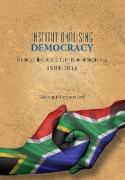- Start
- Institutionalising Democracy. The story of the Electoral Commission of South Africa
Institutionalising Democracy. The story of the Electoral Commission of South Africa
Angebote / Angebote:
South Africa is now more than twenty years old as a democratic republic. Five successful elections have been amongst the major markers of the country's democratic status. The success of the elections has, in turn, yielded stable institutions of governance. Because they were elected through a credible electoral process, the various spheres of government enjoy popular legitimacy. Pivotal in moulding these institutions of governance has been the Independent Electoral Commission (IEC). The first of its kind, this book provides a detailed analysis of how the IEC has made South Africa one of the stable democracies in the world, and subsequently rose to enjoy international prominence. More important than the Commission's achievements, the book focuses our attention on how institutions are formed and evolve. The formation of both the interim and permanent Commissions, in 1993 and 1997 respectively, was a product of South Africa's own history, culture and national sensitivities. Their subsequent evolution, beyond the character of the leadership and internal dynamics, was strongly shaped by the general vibrancy of South African democracy. Amongst the many lessons that this book shares is that public institutions are not established by a mere promulgation of the law. Their full character is realised in the course of life, shaped through sharp contestations by the various actors, who are often-time driven by sectional interests. What one institution becomes ultimately is as much a reflection of the strength of others as it is an outcome of internal dynamics. Public institutions are complementary. And, though they're founded on rules, individuals are similarly important in moulding their character. Institutions hardly have a life of their own, but are imbued such life by those who inhabit them. An equally important lesson that the book stresses is that the Constitution, however noble its intentions, does not necessarily confer rights. Rights are gained by citizens through active mobilisation. The extent to which a society is conscious and enjoys the entire spectrum of its rights depends on the level of activism on the part of its citizenry. On-going activism ensures continued vibrancy of public institutions and enjoyment of rights. This unique book, in other words, is not only a narrative of how institutions are formed and evolve, but also of how democracy remains vibrant.
Folgt in ca. 15 Arbeitstagen




